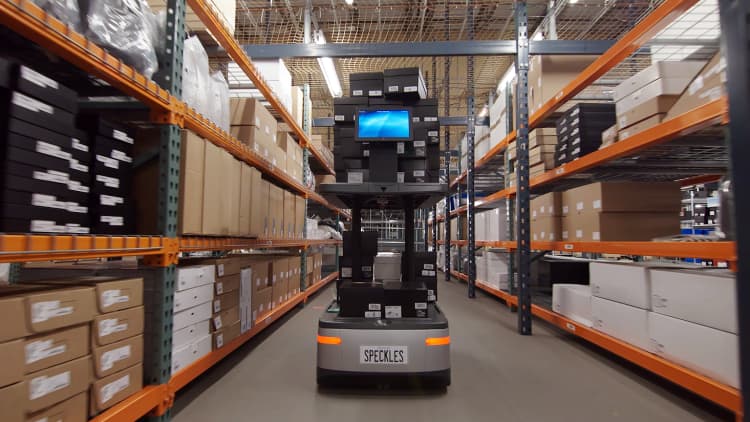
Jerome Dubois and Rylan Hamilton were two executives at Kiva Systems, a robotics company that Amazon bought for $775 million in 2012. (Kiva was founded in 2003 by Mick Mountz.) Within a couple of years of that deal, Amazon took the Kiva robots off the market, rebranded the division as Amazon Robotics, and wielded a big competitive advantage over other logistics businesses and retailers.
Now, they've got a new start-up called 6 River Systems that's bringing Amazon-grade technology to the broader warehouse and fulfillment industry.
E-commerce is expected to grow 12 percent this year in the U.S., and the demand for delivery is growing with it. To help warehouse workers carry their loads, 6 River Systems built a robot called Chuck.
The Chuck is essentially a self-driving cart that leads workers around a facility to the items that they need to pull off of shelves to fulfill a given order. It can also help workers quickly restock items that have been returned.
A screen on the Chuck shows users information about their own productivity during a shift, alerting them if they're close to achieving a personal best, for example. The idea is to motivate them to work as safely and efficiently as possible.
That's a good thing because the industry is actually facing a labor shortage in the U.S. Just 943,000 people worked in warehousing and storage in the U.S. last year, according to data from the Department of Labor. And they helped to pick and pack $394.8 billion worth of goods sold online, representing about 12 percent of total U.S. retail sales, according to Internet Retailer research.
Currently, the start-up's software connects to retailers' and shippers' systems to get data about what orders are coming in the door, and where items are located in a facility. The Chuck also takes in data from on-board sensors to navigate within centimeters of a desired item on a shelf.
The robots could become smarter over time, and help the managers and operators of warehouses identify areas for improvement, essentially managing foot traffic and placement of inventory on shelves.
Dubois told CNBC, "When researchers truly figure out grasping, and things like that, there's also a real opportunity to put an arm on Chuck, and start to use him to help people with different kinds of work."
The company's competition includes Locus Robotics, Fetch Robotics and a handful of other more niche systems designed to help workers in warehouses move goods around more efficiently.
6 River Systems recently attracted $15 million in new venture funding, Dubois said. The round was led by Norwest Venture Partners, joined by Eclipse Ventures and iRobot, the company that created the Roomba vacuum.
Norwest's Matt Howard said one reason his firm invested in 6 River Systems is because its technology can be installed without any changes to a warehouse.
"You can start using the Chuck without pouring in any concrete, or installing cameras and sensors or special networks all over. This will be accessible for small to medium-sized enterprises, which are essential for making deliveries over that last mile," he explained.
While the CEO did not have permission to name early customers of 6 River Systems, he said they already include half a dozen publicly traded companies including massive department stores, big box retailers and third-party logistics businesses. He expects the installed base for Chuck will more than double in the next three months.


